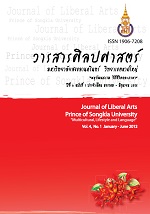The Meanings Given to an Area for Having Tea in Khu Tao Community
Keywords:
The Areas for having tea, tea shops, Khu Tao community, meaningsAbstract
The objectives of this study were to investigate: 1) the emergence and development of the area for having tea in Khu Tao Community; 2) the meanings given to an area for having tea in Khu Tao Community. The data for this qualitative study were collected through observations and interviews with 16 subjects consisting of owners of tea shops, village headmen, community leaders, leading members of groups, Toh Imams, and elderly people. The data were analyzed, and verified using the triangulation method. The results of the study revealed that the emergence and development of the area for having tea in Khu Tao Community was found to be initiated by Chinese who came in by ship to do trading business and stopped at different ports where people bought and sold goods. This resulted in trading shops and tea shops, and areas for having tea subsequently began to emerge in the community. At the beginning, an area in the house was used as an area for having tea. The idea of providing an area for having tea spread to groups of farmers and fishermen who used the area to gather among themselves to talk about their occupation. Later, an area in Masjid Ban Nue became an area for having tea of the community which played an important role in solving problems of the community.
The meanings of the area for having tea in Khu Tao Community were given according to the changing contexts and situations. The meanings that the people gave were: an area for exchanging data and information, an area for negotiation with state power, an area for talking about personal matters, and an area for unity among Muslims. This is evidenced by their gathering for having tea every Friday and their having tea for unity every three months at Masjid Ban Nue.
Downloads
How to Cite
Issue
Section
License
The authors retain the copyright to their article but the Journal of Liberal Arts, Prince of Songkla University reserves the exclusive rights to first publication.






